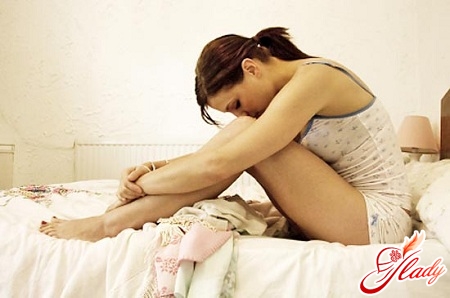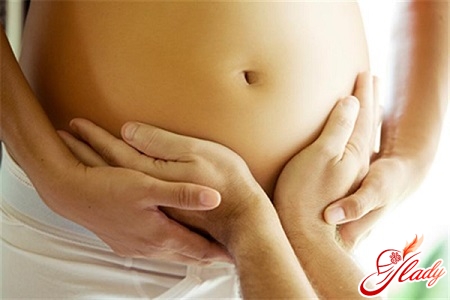 The birth of a child is a real holiday forfamilies. But for a new mother, a new life can turn into a real nightmare, which is often called postpartum depression. Let's try to figure out what's going on here. First, you need to find out the causes of postpartum depression. During pregnancy, most women experience a real attack of hormones. The body changes, and to make it easier for a woman to survive, hormones are released, which, on the one hand, give her joy and help her look at the world more easily, and on the other hand, make the woman more emotional. That is why it is sometimes difficult to understand the behavior and desires of expectant mothers. They cry, then laugh right away, then get sad, and then rejoice for no reason. But such behavior of pregnant women has long surprised no one - everyone is used to it and understands them. Why does this happen? Some neuropsychologists claim that depression after the birth of a baby is most often associated with hormonal imbalance in a woman's body. Female sex hormones are released in huge quantities during pregnancy, and after childbirth, the body tries to return to biological norm. Thus, the inability to quickly psychologically re-adjust to the conditions of a new life leads a woman to the appearance of postpartum depression. Most doctors tend to believe that postpartum depression is associated exclusively with the psychological attitude of a woman, which depends on her character and innate temperament. In support of this, they cite examples of women who, after the birth of a child, are not prone to ailments, but on the contrary, are full of happiness and joy, despite new responsibilities and difficulties with caring for the baby. Let's look into this issue in more detail.
The birth of a child is a real holiday forfamilies. But for a new mother, a new life can turn into a real nightmare, which is often called postpartum depression. Let's try to figure out what's going on here. First, you need to find out the causes of postpartum depression. During pregnancy, most women experience a real attack of hormones. The body changes, and to make it easier for a woman to survive, hormones are released, which, on the one hand, give her joy and help her look at the world more easily, and on the other hand, make the woman more emotional. That is why it is sometimes difficult to understand the behavior and desires of expectant mothers. They cry, then laugh right away, then get sad, and then rejoice for no reason. But such behavior of pregnant women has long surprised no one - everyone is used to it and understands them. Why does this happen? Some neuropsychologists claim that depression after the birth of a baby is most often associated with hormonal imbalance in a woman's body. Female sex hormones are released in huge quantities during pregnancy, and after childbirth, the body tries to return to biological norm. Thus, the inability to quickly psychologically re-adjust to the conditions of a new life leads a woman to the appearance of postpartum depression. Most doctors tend to believe that postpartum depression is associated exclusively with the psychological attitude of a woman, which depends on her character and innate temperament. In support of this, they cite examples of women who, after the birth of a child, are not prone to ailments, but on the contrary, are full of happiness and joy, despite new responsibilities and difficulties with caring for the baby. Let's look into this issue in more detail.
Causes of postpartum depression
Now let's talk about what's going on withwoman after giving birth. A new mother experiences real stress. You won’t believe it, but sometimes even the most difficult job cannot be put on the same level with the life of a young mother. After all, at work you can always take a break to rest, chat with friends or have a coffee. In the end, take a sick leave or vacation. Mothers with small children can only dream of this. They work around the clock, seven days a week. Sometimes they even have to go to the toilet with a child in their arms. And you can’t go to the boss, you can’t ask for a day off... Can you imagine working in such a regime? Exactly... And add to this a certain physical discomfort and a huge sense of responsibility for the most precious thing - for the baby. Most often, this is the main reason for postpartum depression in women.
- Inconsistency of the situation with expectations
Of course, the woman was really looking forward to appearing onlight of her baby. However, as a rule, if a woman is expecting her first baby, she does not even imagine what kind of workload she will face. No, of course, in theory she understood perfectly well that it would be oh so difficult. But theory is one thing, and practice is quite another. And as she realizes this, the young mother begins to panic and experiences real stress. By the way, psychologists say that it is for this reason that postpartum depression most often occurs in women who have become mothers for the first time. As a rule, more experienced mothers already know perfectly well what kind of workload awaits them and how to make their life easier in a given situation. By the way, if there are women in your circle who have recently become mothers, talk to them. They will probably tell you some nuances and secrets.
- Home duties and child care
The state of stress in a mother's life is limiteda short period from a few days to a couple of weeks. This moment is characterized by the fact that the woman is faced with new responsibilities and a new daily routine. A small child requires maximum attention almost 24 hours a day. Just think about it - feeding, care, concern for healthy and timely sleep, feeding again, daily walks in the fresh air, bathing, preparation for a night's sleep, and in between, household chores are also imposed: lunch, laundry, ironing, cleaning the apartment ...
- Insufficient amount of sleep
Some mothers try their bestadjust to the baby's biological clock so that you can extend your sleep a little and gain strength. But even this can be difficult in the first six months - babies wake up several times during the night, do not always want to eat at the usual time and can often be very capricious for no reason.
- Feeling of own impotence and helplessness
Moreover, if a woman has her first child, then almost every mother is afraid of doing something wrong, of harming both the child and herself due to ignorance of some things.
- Visits of friends and relatives
Agree that the process of childbirth itself is exhaustinga lot of energy for the mother, and often after this a large number of relatives and friends who want to personally congratulate the newborn baby and his mother, not only scares the woman, but literally exhausts her psychologically. And not every woman can openly say: “I have postpartum depression now. Don’t touch me or help me!” Perhaps this is why it is so difficult for young mothers. That’s all – favorable conditions for the emergence of postpartum depression have been created
- Guilt
Another interesting point.There are situations when a woman cannot immediately accept the child (there is no joy in communicating with him, there is no feeling of guardianship over the child, etc.). This is due to the fact that many expectant mothers imagined not only their long-awaited child differently, but also the life that will begin with his birth. The feeling of guilt that haunts a woman can also become a decisive factor influencing the occurrence of postpartum depression. But usually everything falls into place after a couple of days. Many couples in such cases turn to their doctor or psychologist, who help find peace of mind, look at everything that is happening from a new angle and find the best solution. There is no need to be afraid or ashamed, because doctors know firsthand what postpartum depression is in women. Do not forget that many people downplay the role of the father in this matter. Who else but a loved one can help out with household chores, help with the child and provide moral support. It is much easier to go through this time together, and the experience gained is undoubtedly priceless. Therefore, sometimes it is worth indulging the little whims of a young mother - perhaps some insignificant detail will help her endure another difficult day and not think about postpartum depression. Often, such melancholy passes after some time (from a couple of days to a couple of weeks), depending on the temperament and character of the mother, on the psychological attitude and external circumstances. But if there is no improvement, this may indicate the presence of such a serious problem as prolonged postpartum depression. Sometimes this can be caused by the baby's illness, lack of support from the husband, family and friends. It is also necessary to find out whether there are other stress catalysts - work, money problems and much more. It is especially important to remember that if a woman has previously been prone to depression, there is a very high probability that postpartum depression will not bypass her. And even an experienced psychologist will not be able to predict how long depression will last in each specific case.
How to recognize the problem on time?
The worst thing about postpartum depression is thatthat it can last for a long time and, of course, it is difficult to cope with it without the help of a specialist. There are a number of signs of postpartum depression that will help to recognize the presence of such a serious problem in time. And this is very important - because the sooner treatment is started, the easier and faster relief will come. And advanced forms of postpartum depression pose an extremely serious threat to the psychological - and physical - health of a young mother. And it is very important to know these signs - even if you are an absolutely balanced person and are 100% sure that depression after childbirth will never affect you. Depression, like chronic fatigue syndrome, is insidious in that it can affect anyone. And most often completely unexpectedly not only for others, but also for himself. Therefore, it is still better to carefully study the symptoms. As they say, forewarned is forearmed. And do not waste time - if you notice these symptoms, immediately take appropriate measures. Don't wait until the situation gets worse and symptoms of neurosis or, even worse, a nervous breakdown appear. These complications will be much more difficult to cope with. And keep in mind that symptoms are a rather subjective indicator. Everything depends on the individual characteristics of each woman's body. One young mother may have all of the symptoms of postpartum depression listed below. And another woman may have only a few of them. In rarer cases, the symptoms are generally very difficult to notice with the naked eye. As a rule, this applies to women who are very good at controlling their emotions. People around them simply will not notice the symptoms, because the woman will not allow herself to give in to her feelings. By the way, such women have it the hardest - there are no symptoms of depression, they themselves will not complain. And loved ones continue to remain unaware that the young mother desperately needs their help, despite the fact that she does not even admit it to herself. But let's still find out what symptoms of postpartum depression exist:
- Moral depression
The woman experiences a constant feeling of sadness,inner emptiness and anxiety. Daily housework and child care become unbearable monotonous work. Good news and small pleasant trifles no longer bring joy to a woman, but only depress her already restless state and feeling of disappointment in everything.
- Increased emotionality
Very often young fathers are genuinely perplexed,why their better half continues to behave as if she is still pregnant. A woman can start a scandal for no reason at all, “explode” and lose her temper over trifles, can burst into tears bitterly over an absolute trifle, for example, a broken cup. Sometimes such a state of a young mother is attributed to the hormonal background, which has not yet had time to recover after childbirth. This is partly true - but only partly. In most cases, such emotional stability is explained by nothing other than the same notorious postpartum depression. It is simply wonderful if the household understands what is happening to the woman and does not contradict her. But if such behavior seems to them to be banal whims, the young mother will have a hard time. After all, in addition to the psychological burden that she is already experiencing, she will also have to sort out relationships with loved ones. And then, you see, it is not far to a nervous breakdown ...
- Change in appetite
Lack of appetite should also be a cause for concern.or, on the contrary, its intensification. During a severe psychological state, namely postpartum depression, women tend to either "eat away" problems, or, on the contrary, refuse normal food, eating on the go. Both situations are extremely undesirable. If a young mother refuses food, she puts her health at risk. During pregnancy, the body's reserves are almost depleted. And if there is no adequate nutrition, the likelihood of developing iron deficiency anemia and vitamin deficiency is quite high. And what this is fraught with is not difficult to guess. You do not want to spend a month in a hospital bed, do you? And this is if for some reason you do not reproach the baby with breastfeeding. And if your baby eats mother's milk, you also put his health at risk. After all, for adaptation and growth, he needs a huge number of various substances that he can only get from mother's milk. And since we have already found out that the mother’s own reserves are simply gone by the time the baby is born, there is simply nowhere to get them for milk. Except, of course, food. And if the mother does not eat anything? That’s right, anemia, vitamin deficiency, delayed growth and development of the baby. What mother would want that? But overeating is no less dangerous. And first of all, for the mother herself. You don’t want to gain a dozen or so extra pounds in a couple of months, do you? Getting rid of them later will be oh so difficult. And believe me, you will want to be beautiful again very, very soon. You will then reproach yourself for gluttony, but it will be too late. But pay attention - refusal to eat does not always indicate a depressive state. Sometimes this can be due to the fact that the “newly-made” mother simply does not have enough strength or time to either prepare food or eat it. In this situation, the young mother should ask for help. Remember what the consequences of malnutrition are?
- Sleep disorders - drowsiness and insomnia
Here you have to be careful - insomniais a very alarming symptom. Insomnia is the most common symptom of psychological disorders. However, make sure that we are talking about insomnia and not about situations in which a woman is forced to give up sleep in order to manage all her chores. Again, the entire daily routine changes and it is often difficult for a woman to calculate the time for all her responsibilities and chores. The alarm should be sounded if a woman really faces insomnia. There is time for sleep, but the head is full of thoughts and worries, as a result of which it becomes difficult for a woman to fall asleep. Excessive drowsiness also does not mean anything good. As a rule, drowsiness appears in cases when a person is on the verge of a nervous breakdown. Of course, in cases where any other physical factors are excluded, for example, this or that disease. In this way, the body tries to protect itself. But in this case, one should not confuse pathological drowsiness and chronic lack of sleep, which are a habitual condition for a young mother. Of course, it is very, very difficult to determine the type of sleepiness on your own. Therefore, it is best to seek help from a doctor who will realistically and objectively assess the condition of the young mother and, if necessary, give his recommendations and prescribe the necessary treatment.
- Lack of ability to concentrate
There are so many new worries, and so little energycope with everything - less and less. Because of this, sometimes even simple things can cause not just frustration, but real hysteria. For example, a request to cook dinner while mom is ironing clothes puts the life of a young father at risk - she can even throw an iron. Of course, we are exaggerating now. But, as you know, there is a grain of truth in every joke.
Treatment of depression
Very often you can hear the question about that,How long does such a depressive state last? It is impossible to say for sure – everything depends on several factors. On the individual characteristics of the woman’s psyche, on her general health, on the help of her loved ones. And especially on how quickly the problem was discovered. To diagnose postpartum depression, it is best to consult a doctor. He will conduct a medical examination of the woman and ask questions to find out what thoughts and worries worry the woman, what feelings and emotions she experiences. The doctor then monitors the patient’s condition for a certain period and makes a diagnosis. If necessary, the doctor will prescribe psychotherapy sessions, physiotherapy, and measures aimed at general strengthening of the body. And in especially severe cases, the doctor may decide on the need for drug treatment. By the way, it can only be carried out under the strict supervision of medical personnel. Very often, young mothers make a mistake that should never be allowed – they begin to take certain sedatives on their own. In fairness, it should be noted that most mothers still understand the danger to the child. And therefore, they prefer herbal medicines. However, many herbs are not as safe as they may seem at first glance. And many of them penetrate into breast milk and can harm the baby. You don’t want that, do you? And, besides, it is necessary to know what drugs a woman needs at the moment. Often, sedatives only worsen the situation, aggravating apathy, depression and complete indifference. In some cases, completely different drugs that stimulate the nervous system are needed. Therefore, leave the right to prescribe pharmacological drugs to the doctor. Unless, of course, you are an enemy to your health and the health of your baby. The doctor knows exactly how to get out of postpartum depression not only as quickly as possible, but also with minimal losses. But does nothing depend on family and friends? Of course, this is not so. And let's find out how to help a woman cope with postpartum depression, and, if possible, avoid it altogether. You will not believe it, but literally a few simple things can solve such a problem as quickly as possible.
- Distribution of duties.
It is necessary to create a new daily routine,rationally planning new responsibilities and, if possible, sharing them with your husband or family members (grandmothers and grandfathers, older children). Don't be shy, ask for help - you deserve it! Surely your household will not refuse to help you. And even if neither your mother nor your mother-in-law is around, and your husband is always at work, you can find a way out of the situation. Surely you have girlfriends? Ask them for help! As practice shows, in most cases women willingly respond to such a request. Especially if they do not have their own children yet. And let this help be minimal. After all, even a trip to the store takes a lot of time and energy from a young mother.
- Daily regime
Try to distribute the time needed forhealthy sleep. After all, if dad gets up to look after the baby once a night, no harm will come. Are you breastfeeding? So what, let him just put him to your breast. And then put him in the crib - you won't have time to really wake up. Do you feel sorry for your husband, who has to go to work tomorrow morning? Well, caring for your loved ones is worthy of praise. But remember that you are not on a resort either. What can you do? Nobody promised that it would be easy. And in the daytime, try to go to bed at the time when the baby is sleeping. Do you have a lot to do? So be it - you do not live in a museum, a floor that has not been washed for one day is not a tragedy of universal proportions. Do not have time to cook dinner? Well, a reason to treat yourself - you can always order food from a restaurant. Well, or pizza, at worst. And a nursing mother, who can only dream of pizza for now, will be fine with a cottage cheese dessert or yogurt. Is dad indignant? Explain to him that this only lasts until you come to your senses. Doesn't understand? Under a plausible pretext, leave him alone at home with the baby for a couple of hours. And try to time it so that the baby is awake. Most likely, after this, no more complaints will arise against you in your life.
- Food
By the way, speaking of food.The above option is suitable only for emergency cases - it should not become a system. Make sure that your diet is complete and balanced. By the way, for this it is not necessary to stand for hours at the stove, inventing more and more new dishes. There are many recipes that allow you to eat tasty and healthy.
- Appearance
No matter how you look at it, a woman always remainswoman. Even if she became a mother just a couple of weeks or months ago. And you always want to look good. And an unkempt appearance, hair with overgrown roots, a stained housecoat will ruin anyone's mood even without postpartum depression. As practice shows, those young mothers whose depression lasts long enough, do not bother especially with their appearance. But those women who find time and take care of themselves, practically do not have depressive states. So take note of this method of combating postpartum depression. Has your soul become completely sad? Visit a hairdresser or go to a clothing store - how long can you put it off? And do not rush to object - such little things are a great distraction from negative thoughts and lift your mood.
- Communication with people
Don't become a recluse under any circumstances.Do not avoid contact with people, no matter how hard it may be at first. Very soon this reluctance to see anyone will pass, and you will begin to enjoy communication. Do you have no one to talk to? Are your friends busy, and your household members working? No big deal! Take the stroller and go outside. Even psychologists advise women in such a situation to start communicating with other mothers. And not only to get good advice and share your experience, but also to realize that other mothers do not always immediately find a way out of difficult situations. It is necessary for a woman's self-esteem to increase, and she to get rid of the anxiety that she can constantly harm herself or her child in some way. And women's secrets have a right to exist - sometimes it is oh so nice to gossip. And it is very likely that you will make new friends among young mothers. After all, your children will grow up together, most likely go to the same kindergarten, and then to school. And over a cup of coffee you will fondly remember your fears and worries.
- Expressing your emotions
As psychologists say, for a human beingThere is nothing more terrible for the psyche than the inability to open up emotionally. This circumstance can lead even a healthy person to a nervous breakdown, not to mention the fragile psyche of a woman who has recently become a mother. Sharing impressions, news, discoveries and joys is extremely important. If the mother is an introvert by nature, self-expression will help in such cases - keeping a baby's diary, taking photos, drawing, knitting - all this not only relieves the woman emotionally, but also helps to refresh the thoughts in the head and recharge with a good mood. By the way, the same is true for negative emotions - they also need to be given an outlet. If you have someone to talk to, share your fears, worries and doubts - this is just wonderful. But if not - do not despair. You can resort to one psychological technique - the simplest, but very effective. Take a piece of paper - this is where you will transfer all your negativity. If you draw well, try to depict your fears and worries with watercolors. Can't draw? No problem, make a list. Done? Burn the sheet. As a rule, this method helps quite effectively - depression lasts a much shorter period of time.
- Awareness of what is happening
It is important to remember that when caring for a child,Sometimes you may feel distant from him. Emotional closeness may change depending on the circumstances and psychological state of the woman, but this does not mean that she is a bad mother. A similar phenomenon is observed in a huge number of new mothers, you are not the first and not the last. In no case blame yourself for this, otherwise your psychological state will rapidly deteriorate. Can't cope with anxious thoughts? Talk about it with your friends who already have children - they will probably tell you about a similar situation. If even after this the feeling of guilt does not disappear, you should think about seeking help from a psychologist. In no case should you leave such an issue unattended, since such a state can turn into serious problems. And the longer it lasts, the higher the risk of developing various nervous disorders.
- Pamper yourself
It is necessary to allow at the first opportunitya woman can pamper herself a little – shopping, meeting with friends, a romantic evening and much more. All this will help to abstract a little from the hard workdays and recharge with energy. By the way, do not forget about the husband, who after the birth of the child may feel alienated. Try not only to go through new challenges together, but also to rejoice together and celebrate all the achievements and victories;
- Sexual life
Don't lose sight of your sex life.The problem of many women is that after giving birth they feel unattractive to the opposite sex. After all, we know that an extra millimeter seems a hundredfold to women, and everyday worries without self-care make even the world's first beauties shudder at their reflection in the mirror. Husbands should compliment their wives more often, try to discuss problems and not allow their spouses to doubt that they are women first and foremost. Moreover, in most cases, a woman has no energy left for her sex life. However, it is extremely important for them to know that they are still loved and desired. And as for sex itself, a man needs to be patient a little. If he takes care of his wife, helps her, her sex life will very quickly return to normal. Moreover, most likely, the wait will be rewarded a hundredfold. Most women claim that after giving birth, their sex life becomes much brighter and richer. Of course, if the couple has enough wisdom and patience to survive this difficult period together. By the way, most young mothers, even the most reserved ones, during this difficult period for them have concerns that their husband has a mistress. And no matter how much a man tries to prove to his wife that this is not so, the worries do not disappear. Especially if the woman does not confirm in the man's words and actions that he is still interested in her primarily as a woman, and not just the mother of his child. If a man freaks out and avoids the conversation, the woman's suspicions will only strengthen. Therefore, it is extremely important for a man to show restraint and patience - everything will fall into place very quickly. And how many nerves he will save his wife!
- Timely contact with a doctor
In some cases, it may also be effectiveconsulting a doctor or psychologist before the onset of depression. In such cases, a woman can be prescribed antidepressants that are safe for both the mother and her baby. How many complications can be prevented in this way! Remember that any depression can be treated fairly quickly. And how long it will last in your case depends primarily on you. The main thing is for a woman to understand that she is the best mother in the world, and any problems are easily solved. Depression that occurs in life after the birth of a baby, the treatment of which is possible and quite effective, will not last forever. You just need to look at things adequately, not be afraid to open up to your happiness and walk towards it with a confident gait. We recommend reading:









